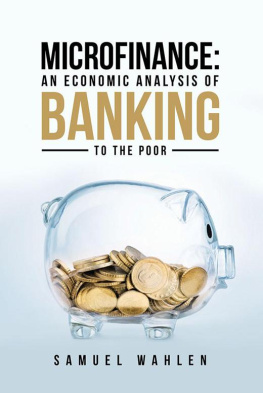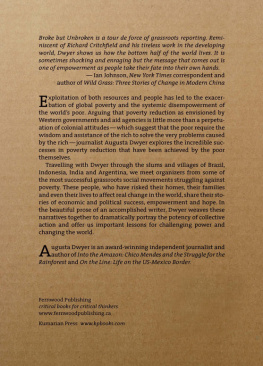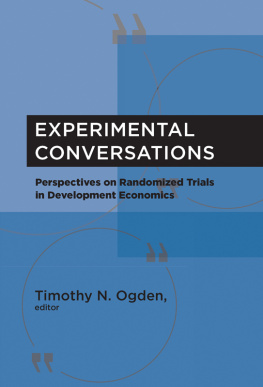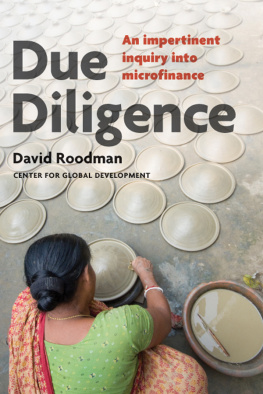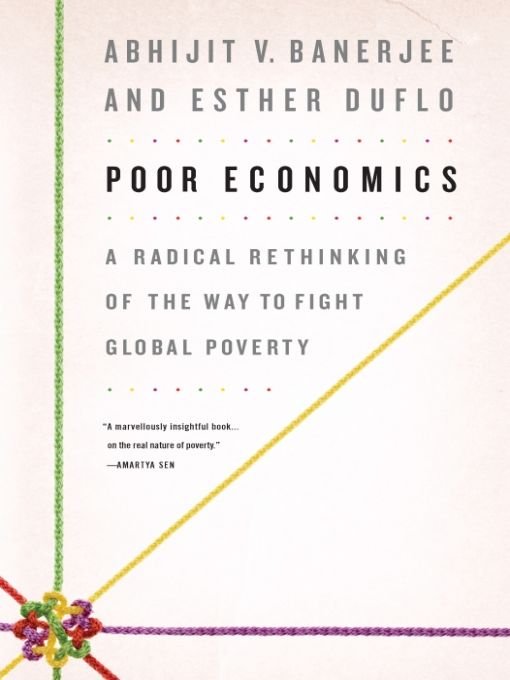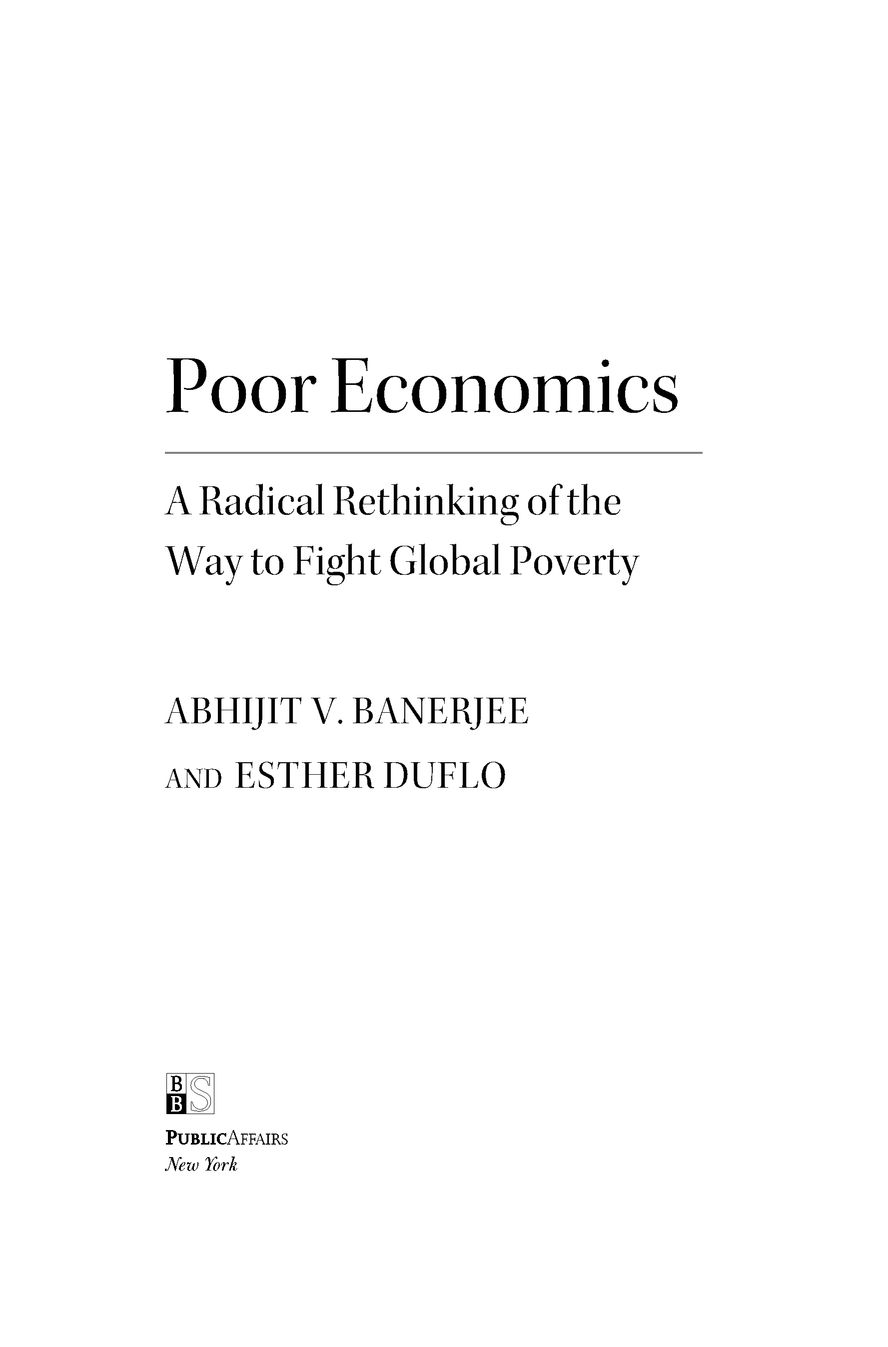Table of Contents
For our mothers,
Nirmala Banerjee and
Violaine Duflo
Foreword
Esther was six when she read in a comic book on Mother Teresa that the city then called Calcutta was so crowded that each person had only 10 square feet to live in. She had a vision of a vast checkerboard of a city, with 3 feet by 3 feet marked out on the ground, each with a human pawn, as it were, huddled into it. She wondered what she could do about it.
When she finally visited Calcutta, she was twenty-four and a graduate student at MIT. Looking out of the taxi on her way to the city, she felt vaguely disappointed; everywhere she looked, there was empty spacetrees, patches of grass, empty sidewalks. Where was all the misery so vividly depicted in the comic book? Where had all the people gone?
At six, Abhijit knew where the poor lived. They lived in little ramshackle houses behind his home in Calcutta. Their children always seemed to have lots of time to play, and they could beat him at any sport: When he went down to play marbles with them, the marbles would always end up in the pockets of their ragged shorts. He was jealous.
This urge to reduce the poor to a set of clichs has been with us for as long as there has been poverty: The poor appear, in social theory as much as in literature, by turns lazy or enterprising, noble or thievish, angry or passive, helpless or self-sufficient. It is no surprise that the policy stances that correspond to these views of the poor also tend to be captured in simple formulas: Free markets for the poor, Make human rights substantial, Deal with conflict first, Give more money to the poorest, Foreign aid kills development, and the like. These ideas all have important elements of truth, but they rarely have much space for average poor women or men, with their hopes and doubts, limitations and aspirations, beliefs and confusion. If the poor appear at all, it is usually as the dramatis personae of some uplifting anecdote or tragic episode, to be admired or pitied, but not as a source of knowledge, not as people to be consulted about what they think or want or do.
All too often, the economics of poverty gets mistaken for poor economics: Because the poor possess very little, it is assumed that there is nothing interesting about their economic existence. Unfortunately, this misunderstanding severely undermines the fight against global poverty: Simple problems beget simple solutions. The field of anti-poverty policy is littered with the detritus of instant miracles that proved less than miraculous. To progress, we have to abandon the habit of reducing the poor to cartoon characters and take the time to really understand their lives, in all their complexity and richness. For the past fifteen years, we have tried to do just that.
We are academics, and like most academics we formulate theories and stare at data. But the nature of the work we do has meant that we have also spent months, spread over many years, on the ground working with NGO (nongovernmental organization) activists and government bureaucrats, health workers and microlenders. This has taken us to the back alleys and villages where the poor live, asking questions, looking for data. This book would not have been written but for the kindness of the people we met there. We were always treated as guests even though, more often than not, we had just walked in. Our questions were answered with patience, even when they made little sense; many stories were shared with us.
Back in our offices, remembering these stories and analyzing the data, we were both fascinated and confused, struggling to fit what we were hearing and seeing into the simple models that (often Western or Western-trained) professional development economists and policy makers have traditionally used to think about the lives of the poor. More often than not, the weight of the evidence forced us to reassess or even abandon the theories that we brought with us. But we tried not to do so before we understood exactly why they were failing and how to adapt them to better describe the world. This book comes out of that interchange; it represents our attempt to knit together a coherent story of how poor people live their lives.
Our focus is on the worlds poorest. The average poverty line in the fifty countries where most of the poor live is 16 Indian rupees per person per day. People who live on less than that are considered to be poor by the government of their own countries. At the current exchange rate, 16 rupees corresponds to 36 U.S. cents. But because prices are lower in most developing countries, if the poor actually bought the things they do at U.S. prices, they would need to spend more99 cents. So to imagine the lives of the poor, you have to imagine having to live in Miami or Modesto with 99 cents per day for almost all your everyday needs (excluding housing). It is not easyin India, for example, the equivalent amount would buy you fifteen smallish bananas, or about 3 pounds of low-quality rice. Can one live on that? And yet, around the world, in 2005, 865 million people (13 percent of the worlds population) did.
What is striking is that even people who are that poor are just like the rest of us in almost every way. We have the same desires and weaknesses; the poor are no less rational than anyone elsequite the contrary. Precisely because they have so little, we often find them putting much careful thought into their choices: They have to be sophisticated economists just to survive. Yet our lives are as different as liquor and liquorice. And this has a lot to do with aspects of our own lives that we take for granted and hardly think about.
Living on 99 cents a day means you have limited access to informationnewspapers, television, and books all cost moneyand so you often just dont know certain facts that the rest of the world takes as given, like, for example, that vaccines can stop your child from getting measles. It means living in a world whose institutions are not built for someone like you. Most of the poor do not have a salary, let alone a retirement plan that deducts automatically from it. It means making decisions about things that come with a lot of small print when you cannot even properly read the large print. What does someone who cannot read make of a health insurance product that doesnt cover a lot of unpronounceable diseases? It means going to vote when your entire experience of the political system is a lot of promises, not delivered; and not having anywhere safe to keep your money, because what the bank manager can make from your little savings wont cover his cost of handling it. And so on.
All this implies that making the most of their talent and securing their familys future take that much more skill, willpower, and commitment for the poor. And conversely, the small costs, the small barriers, and the small mistakes that most of us do not think twice about loom large in their lives.
It is not easy to escape from poverty, but a sense of possibility and a little bit of well-targeted help (a piece of information, a little nudge) can sometimes have surprisingly large effects. On the other hand, misplaced expectations, the lack of faith where it is needed, and seemingly minor hurdles can be devastating. A push on the right lever can make a huge difference, but it is often difficult to know where that lever is. Above all, it is clear that no single lever will solve every problem.


